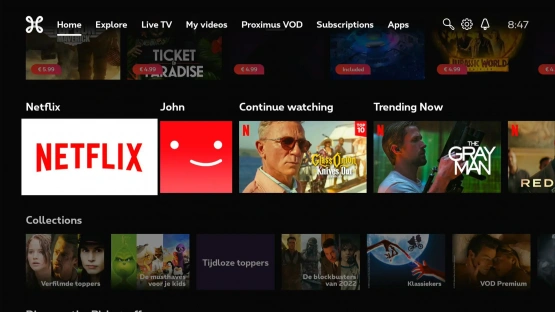Remember the excitement of Friday nights, perusing shelves lined with colorful VHS tapes and DVDs? Remember those very short weekends when we’d bond with family members over a two-hour runtime of “Osuofia in London” or even “Igodo” for those with an appetite for adventure and a spice of horror?
Long before video streaming services like Netflix, Amazon Prime, and Hulu became a thing, there was the Nigerian video rental market, a once booming industry where movie enthusiasts would flock to local shops to borrow their favorite films. These stores offered a wide range of movies and TV shows, from Nollywood productions to Hollywood blockbusters.
This market, which helped give rise to the term “home videos,” was a testament to the country’s love for cinema and storytelling, serving as a cornerstone of entertainment and social interaction among individuals and families alike.
However, like many traditional industries, it faced an unexpected plot twist. Or, in this case, twists.
The Golden Age of Video Rentals in Nigeria
In the 1990s and early 2000s, Nigeria’s video rental market was at its peak. It was a place where families would bond over weekend movie nights, and friends would gather to watch the latest blockbuster releases.
Prior to its emergence, watching movies at home meant relying on television broadcasts or purchasing expensive VHS tapes. The video rental market offered a middle ground, providing a convenient and affordable way to access a wide variety of films. Local video stores, often family-owned businesses, became more than just businesses. They became community hubs for entertainment, and now, as we look back fondly, memories.
Customers could browse the tiny aisles, seeking recommendations from friendly staff who were movie lovers themselves.
The success of the video rental market in Nigeria can be attributed to these 3 major factors:
1. Limited entertainment options: Before the digital revolution, video rentals provided an affordable and accessible form of entertainment.
2. Growing middle class: An expanding middle class with disposable income fueled the demand for home entertainment.
3. Nollywood boom: The rise of Nigeria’s film industry created a constant stream of new content for rental shops.

So, where did it all go wrong?
The Rise of Streaming: When the Credits Started Rolling
Fast forward to the 2010s, and the once-thriving video rental market began to face unprecedented challenges. The advent of digital technologies, high-speed internet connections, and changing consumer preferences started to reshape the entertainment landscape, leaving traditional rental shops struggling to adapt.
The result of this gave rise to the emergence of streaming platforms, third-party channels, and websites where many Nigerians opted to stream or download movies and TV shows illegally.
The rental market, which relied on physical media and the act of going to a store to rent a movie, couldn’t compete with the on-demand convenience and vast libraries offered by these new technologies. With just a few clicks, viewers could access thousands of movies and TV shows, from the latest releases to cult classics.


In a nutshell, this fall could be summed up in 7 parts:
1. Rise of Digital Streaming: Platforms like iROKOtv, Ibaka, and later, international giants like Netflix, offered convenience and vast libraries at users’ fingertips.
2. Improved Internet Infrastructure: Better connectivity allowed more Nigerians to access online content easily.
3. Piracy: Widespread illegal downloads and pirated DVDs undercut the rental market’s profitability.
4. Shift in Consumer Behavior: Younger generations preferred on-demand content accessible via smartphones and other devices.
5. Limited Selection: Compared to streaming services with vast libraries, video rental stores had a finite selection of movies. Customers might find themselves disappointed if the latest blockbuster or a particular classic wasn’t available.
6. Inconvenience: Renting a movie involved a trip to the store, browsing selections, and hoping the desired movie was in stock. Streaming services eliminated this inconvenience, allowing viewers to access movies instantly from the comfort of their homes.
7. Late Fees and Damage: Late fees and charges for damaged tapes were a source of frustration for many renters. Streaming services offered a transparent pricing structure, eliminating these concerns.
As these forces converged, many video rental shops found themselves facing dwindling customer bases and shrinking profits. The once-bustling Friday night crowds began to thin, and shelves that once held the latest blockbusters started gathering dust.


The Rise and Fall of the Nigerian Video Rental Market: Lessons Worth Learning
The fall of the Nigerian video rental market offers valuable lessons for businesses of all stripes. Here are some key takeaways:
1. Sink or Swim: Technological advancements can disrupt entire industries. Businesses must be prepared to adapt and innovate to stay relevant. While streaming services were offering convenience and affordability, video rental stores were stuck in the past, relying on physical rentals and limited selection. The industry failed to innovate and evolve, leading to its downfall. This is a valuable lesson for businesses in any industry.
2. Focus on Customer Convenience: Consumers today value convenience above all else. Businesses need to prioritize user experience and offer solutions that cater to on-demand needs.
3. Content is King: The common cliché “content is king” cannot be overstated. In the entertainment industry, this notion holds doubly true, as a strong content library is of utmost importance. In the same vein, businesses need to curate content that resonates with their target audience if they hope to stay afloat.
4. Community Matters: While the rental video market might be a thing of the past, some shops managed to hold on longer by fostering a sense of community and offering personalized service that streaming platforms couldn’t match. This is one area it succeeded in and is worth emulating for all businesses.
5. Nothing Lasts Forever: The demise of the video rental market serves as a poignant reminder that nothing lasts forever. What was once a staple of entertainment, a hub of community and social interaction, can become a relic of the past.
This truth can be difficult to accept, especially for those who grew up with the thrill of browsing video shelves and the joy of discovering new movies. Yet, acknowledging this truth can be liberating, allowing us to evolve and adapt while cherishing the moments we had and finding solace in the memories created.
6. Disruption as a Catalyst for Growth: The rise of streaming services and the fall of the video rental market may seem like a tale of disruption and destruction. However, it’s also a story of growth and transformation. The same technological advancements that killed the video rental market have given birth to new industries, new business models, and new opportunities.
This disruption has forced entrepreneurs and innovators to think creatively, to pivot and adapt, and to find new ways to meet the changing needs of consumers.
Closing Credits: Lessons Learnt
The rise and fall of Nigeria’s video rental market is more than just a tale of technological disruption. It’s a reminder of the constant evolution in consumer behavior and the need for businesses to stay agile and adaptive. Today, while a few video rental stores still exist in Nigeria, the industry is a shadow of its former self, and many have had to adapt to the changing landscape by diversifying their services or closing down altogether.
While we may nostalgically remember the charm of browsing physical video libraries, the lessons learned from this industry’s transformation can guide entrepreneurs and investors in navigating future market shifts.
As technology continues to evolve, the future of entertainment remains exciting and unpredictable, as does the entire business-scape. The next big market disruption could be just around the corner. Will you be ready to press play on new opportunities?
Bravewood is licensed by the Central Bank of Nigeria to provide investments with low risk and high returns for Nigerian professionals.



